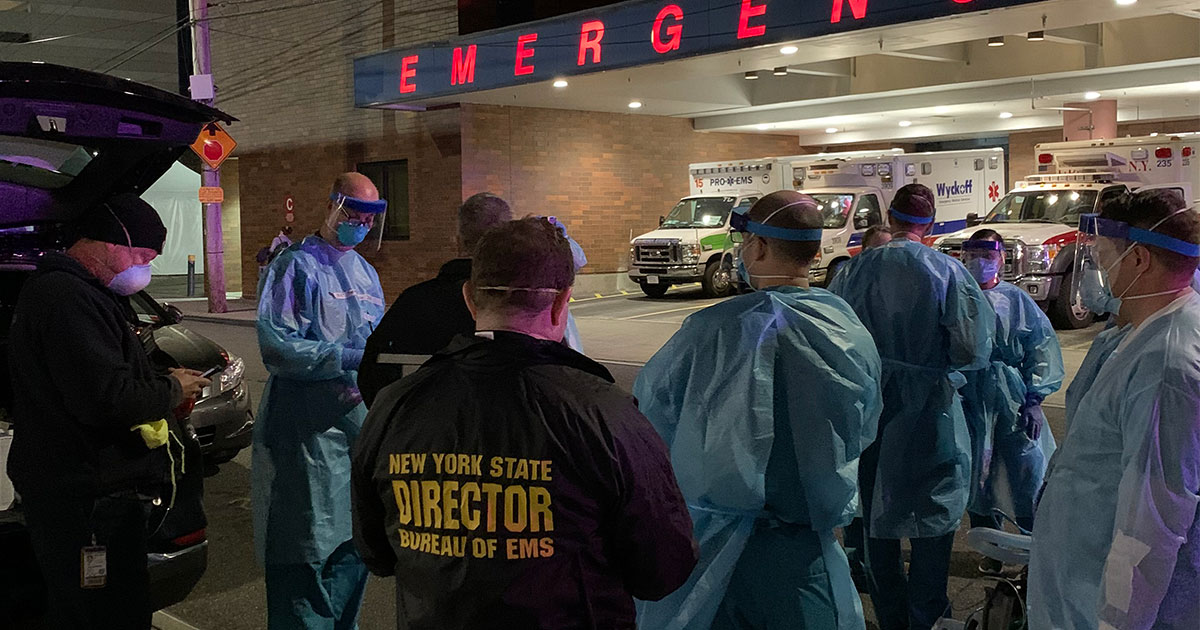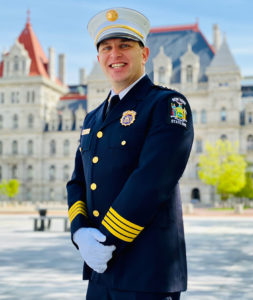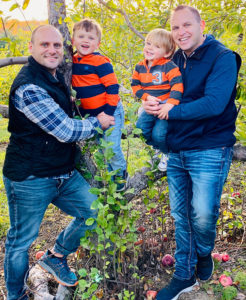A Babson-Made Public Servant

As a student at Babson College, Ryan Greenberg ’99 had a different experience than many.
A volunteer firefighter in his hometown, Greenberg was part of Babson’s emergency medical services. Working with Babson police, he and other students who were certified emergency medical technicians (EMTs) would respond to emergency calls on campus. They even were on standby during rugby games.
It was a type of student service that doesn’t exist now. “It was a cool way to experience college,” Greenberg says. “We were really busy on Friday and Saturday nights.”

At first, Ryan Greenberg ’99 wasn’t sure a leadership position in government was for him. “I like innovation and change and stirring things up,” he says.
Greenberg enjoyed being there for people during their tough times. “You get to help your community,” he says. “When you can really make a difference, and take away the anxiety or pain people are feeling, there is nothing like it.” After he graduated from Babson, he even went to paramedic school. “I always wanted to achieve that clinical level,” he says. “I never thought it would be a career. I thought it would be a side job or a hobby.”
Fast forward more than two decades, though, and helping people in an emergency is still very much the focus of Greenberg’s life and career. Since 2018, he has served as director of New York State’s Bureau of EMS, which oversees some 70,000 EMTs and paramedics and 1,700 EMS agencies. His tenure has been a challenging one, coming during the chaos and uncertainty of the pandemic, but it also has been rewarding. Armed with his Babson education and experiences as an entrepreneur, he was able to go into state government and make a difference during a difficult time.
“I truly believe my Babson education has made me a better public servant,” Greenberg says.
A Once-in-a-Lifetime Opportunity
When Greenberg first heard about the EMS position opening, though, he didn’t think a job in government was for him. He was an entrepreneur running his own business. He figured the position would be mired in bureaucracy and the status quo. “I like innovation and change and stirring things up,” he says. “I didn’t think they would want me.”
For some 20 years, Greenberg ran his own management service organization, setting up hospital-based EMS systems. He would write up a business plan for a new EMS system, get it up and running, and then move on to the next one. It was essentially one entrepreneurial challenge after another. “I used my Babson knowledge all the time in the hospital world,” Greenberg says.
When he ended up applying for the state EMS director job and landing an interview, acquaintances told him to play it safe. Don’t talk about innovation or change. Those in government don’t want to hear about that, they told him.
“I truly believe my Babson education has made me a better public servant.”
Ryan Greenberg ’99, director of New York State’s Bureau of Emergency Medical Services
So, Greenberg was surprised when, for the first question in his first interview, someone asked: “Health care is changing. What will you do to help EMS keep up?” That was a signal to him that all those assumptions that he and others had made about government agencies were wrong, that maybe they weren’t so resistant to change after all.
When he was eventually offered the job, he decided to take it, even though it meant a pay cut. “When you look at your ability to effect change, I had never taken anything to a state level,” he says. “I realize this was a once-in-a-lifetime opportunity.”
Starting in the job, Greenberg made sure to do a lot of listening. Traveling around the state in what he called the “one wish tour,” he asked EMS providers, if they could change one thing about EMS, what would it be. Change came slowly but steadily. New technology was implemented, and new ways of doing things adopted. “The first two years, we had a lot of achievements,” Greenberg says.
Then came March 2020.
Rushing to Respond
As the pandemic hit, Greenberg’s agency rushed to respond. With emergency calls skyrocketing in New York City, the state Bureau of EMS coordinated bringing in more than 350 extra ambulances from around the country, and with so many unknowns in those early days of COVID-19, a weekly call was created where EMS departments from across the state could hear the most current information and ask questions.

In the pandemic’s early days, Ryan Greenberg ’99 (right) worked weeks in New York City away from his family: (from left) husband Jonathan and sons Jett and Tripp.
Greenberg helped to set up New York City’s Javits Convention Center as a temporary hospital for COVID-19 patients. He was amazed as a space often used for car shows and tech conventions was transformed into a giant medical facility, though the work kept him away from his husband and two young children in Albany for five weeks. “Our little one was my shadow before I left,” he says. “When I came home, he looked at me like he wasn’t sure who I was. It was tough.”
Change came fast during the pandemic. Since large groups could no longer gather, for instance, paper-based EMT exams moved online. So did lectures. “As tough as the pandemic was, there were things that happened in the pandemic that would have taken us 10 years to do otherwise,” Greenberg says.
Greenberg credits his Babson education for helping to prepare him for his job. “It has given me a different way to look at things,” he says. Greenberg encourages other Babson graduates to follow in his footsteps and consider taking a position in government. “It is one of the opportunities in your life when you have to say, life isn’t just about how much money you can make,” he says. “It can be about making the world a better place.”




